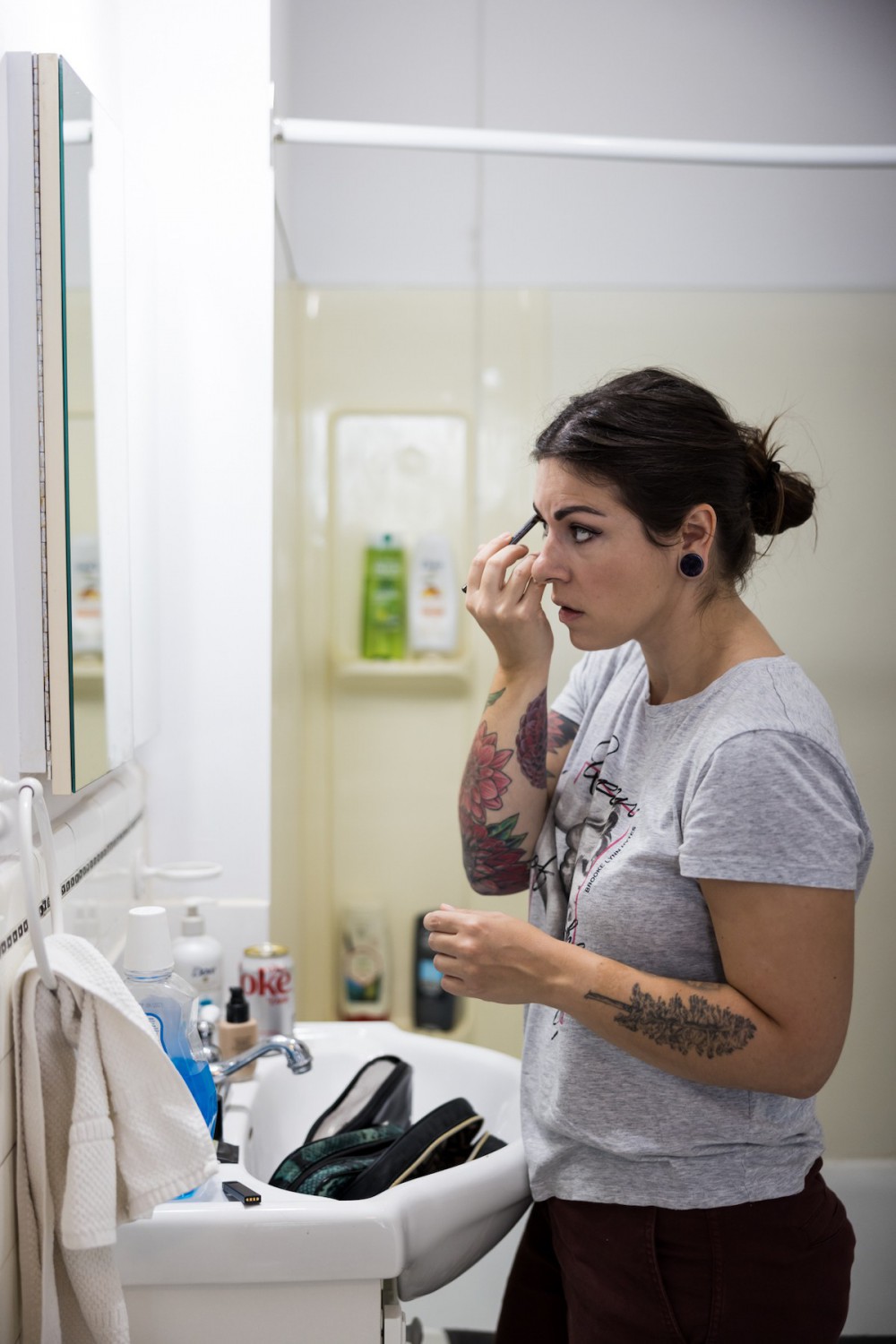What if sex workers had institutional representation that could fight for better working conditions? Like a support network, but with the means to organize around workplace grievances in ways that sex workers’ rights groups can’t?
In early 2020 Zeta, a sex worker living in Nova Scotia, was looking for this kind of project: they wanted to get involved with organizing sex workers, like in a union.
Some types of sex work can be very isolating, making it difficult to form a community. Working predominantly online, Zeta didn’t know many other sex workers at the time. “I didn’t know who else was in my city working online, because usually people don’t want to reveal where they’re located,” they say. “I knew there were others, but I didn’t know where to find them.” (Zeta requested that Briarpatch use their professional name, given the criminalization of sex work in Canada.)
But Zeta was already a member of the Industrial Workers of the World (IWW), so they contacted the organizing department of the union’s North American Regional Administration. “I just told them, ‘I’m a sex worker. I would like to organize my industry and I have no idea how to begin.’”
The IWW is a grassroots global union that differs from traditional trade unions in a few key ways. Rather than dividing workers by skill or trade, the IWW organizes all workers within an industry into one union. It accepts workers worldwide from workplaces both with and without other unions of their own, often using direct action and community mobilization to pressure bosses. The goal is to empower workers to organize their industry and build worker power from the bottom up, allowing for much more active members and democratic decision-making. While it’s a registered union with bargaining units in the U.S. and the U.K., in Canada the IWW does not currently have any certified bargaining units.
“I just told them, ‘I’m a sex worker. I would like to organize my industry and I have no idea how to begin.’”
The department told Zeta about the Sex Workers Industry Movement (SWIM), a union that was just getting off the ground in Montreal. SWIM is a project of the Syndicat associatif des travailleu.ses.rs autonomes du Québec (S’ATTAQ), an IWW local that organizes freelancers from different industries, from game workers to journalists.
“The idea behind SWIM is that sex workers are kind of like freelancers, too, and there’s some overlap between issues faced by other freelancers and sex workers,” Zeta explains. “I’ve been finding that pretty accurate. Thinking about us as freelancers has been helpful in organizing.”
Generally speaking, freelancers are not tied to a brick-and-mortar workplace, have no employee benefits, have several employers, and lack income stability due to the nature of their work. Sex workers often share these conditions – especially those working online or doing full service. As a result, “It’s hard to make those connections or see each other as co-workers,” says Zeta.
What’s in a union?
“Organizing happens any time two or three people meet in a room, and specifically get together to talk about developing a plan to improve their workplace conditions. So that’s how it started,” says Selena Phillips-Boyle, a S’ATTAQ organizer who is involved with SWIM as an external organizer. Phillips-Boyle advises and supports SWIM’s worker organizers, the ones labouring in the industry who know first-hand the issues they face.
The idea for SWIM first came about in late 2019, when two sex workers who were IWW members met with Phillips-Boyle to discuss the possibility of starting a sex workers’ union.
Jesse Dekel was one of these members. She and the other IWW member envisioned a worker-led institution that could represent and support sex workers in fighting for better conditions, build worker power, and provide educational opportunities – all in ways that existing support groups and non-profits couldn’t.
SWIM launched in January 2020, and members were organizing in person until the COVID-19 pandemic hit. Like every other grassroots project, SWIM had to figure out how to make Zoom organizing work. “It was exciting and frustrating at the same time,” says Dekel. She doesn’t like online organizing, but there was nothing else to be done.
In the beginning, members were tasked with finding two people to bring to meetings and invite into the fold of SWIM. This was an effort in organizing the community, a crucial aspect of freelancer organizing since workers are so fragmented. “Unionizing is 1,000 per cent harder for freelancers,” says Dekel.
When a stripper faces wage theft, it’s committed by the club’s owner, and a union can take the owner to court or pressure him to pay up. Supporting that worker in reclaiming their pay is harder to do from a distance.
The community building takes time. “We don’t want to have an explosive growth that we can’t keep up with, but we want to maintain a consistent strategy,” says Phillips-Boyle. Much of the work being done right now revolves around thinking practically about what the union can do to support its members. SWIM conducted a survey of grievances among workers and is looking at the results to figure out where to focus its efforts.
Wage theft comes up a lot. It’s something that is hard for sex worker support groups and non-profits to help out with, and it can take many forms. One form that SWIM has on its radar is the minimum payout requirement that is standard on subscription sites like OnlyFans – sex workers are not able to take out their money until they hit a threshold. SWIM has discussed petitioning to get those requirements removed.
SWIM’s latest meeting was focused on building capacity. Members talked about how to approach other sex workers to have one-on-one conversations about joining the union. Zeta says the monthly meetings are generally jovial, but this time was a bit different.
“A lot of sex workers are still scrambling with the OnlyFans mess,” they say. At the end of August, OnlyFans announced it would be banning sexually explicit content, only to suspend the ban a short time later. Zeta says that despite the latest development, sex workers just don’t trust the site anymore and many are trying to move to other subscription sites. It’s been a stressful time, as workers worry about how to make up lost income should the site move ahead with the ban.
At the meeting, workers talked about using the OnlyFans debacle as a conversation point during one-on-ones, to get workers thinking about what they could gain from joining a union. Next meeting will be a co-working session, a chance to get some union or personal work done all together with each other’s support.
Zeta says the resource sharing between SWIM members is a big help. The members point each other toward sex worker-friendly accountants and hold workshops to demystify the terms of service on adult content sites. With the pandemic, the need for pooled resources only grew. Folks who weren’t used to online work suddenly had to figure it out – and fast. “I spent a lot of time teaching my friends how to be cam models,” says Zeta.
At the meeting, workers talked about using the OnlyFans debacle as a conversation point during one-on-ones, to get workers thinking about what they could gain from joining a union.
So far, SWIM is the only sex workers’ union in Canada. Many organizations – from Maggie’s in Toronto to Stella in Montreal – provide valuable services, support, and advocacy for sex workers. But Zeta argues that these organizations cannot replicate the benefits that can come with organizing workers through a union.
“I see unions as something for us and by us. It’s not a top-down thing where we’re getting handouts,” Zeta explains. “Building worker power is more sustainable in the long run.”
SWIM works closely with another IWW local out of New York, the Sex Trade Workers Industrial Union 690, with members of each local attending each other’s meetings to share ideas and learn from each other’s tactics. IWW locals are usually comprised of members in the same city, but freelance work can happen anywhere, so S’ATTAQ and its projects include members from outside Quebec. Dekel has moved to New Zealand since SWIM launched and is still a member, although she has had to reduce her involvement. But as SWIM establishes its membership requirements, it is asking pragmatic questions about the level of support the union can give to workers farther away.
OnlyFans work isn’t location specific. It’s an online company with workers around the world who share labour conditions, so organizing OnlyFans workers should be strategized like organizing Amazon workers, Phillips-Boyle says. But when organizing strippers in a club, the kind of localized support the union can provide matters a lot more: when a stripper faces wage theft, it’s committed by the club’s owner, and a union can take the owner to court or pressure him to pay up. Supporting that worker in reclaiming their pay is harder to do from a distance.
Zeta says that sex work also looks different depending on where you are in Canada, a result of variations in legislation. Take strip clubs: they are all over the place in Montreal, yet nowhere to be seen in Halifax. Any strip clubs near Halifax are relegated to Dartmouth, particularly an industrial area called Burnside – meaning strippers must travel to and work in a remote neighbourhood. In Montreal, strippers are more likely to work in centrally-located clubs, but some of those downtown clubs see frequent visits from Montreal police checking workers’ IDs.
“Workers in the industry in that area know their industry better than anybody else, so they should be able to have the autonomy to organize it as they see fit,” says Zeta. “I kind of see SWIM as assisting people in organizing and supporting each other.”
Decriminalizing sex work
One area that SWIM is not currently focusing its energy on is the decriminalization of sex work.
Currently, Canada has an “end demand” approach to sex work legislation. It’s technically not an offence to sell sex, but it is to buy it. It’s also illegal to do just about everything associated with it: stopping a car to talk to a client, advertising another sex worker’s services, receiving money someone else earned through sex work. It’s illegal to run an escort agency or massage parlour, since this is “materially benefitting from sexual services.” It’s illegal to work as a driver, receptionist, or bodyguard for a sex worker. All this legislation makes it hard to do their jobs safely, sex workers say. That’s why sex workers’ rights groups lobby for complete decriminalization.
“If no organization was working on de-crim I would probably agree that that should be the top priority for SWIM,” says Phillips-Boyle, “but because that work is already being done, we’re trying to maintain a focus on other workplace issues.”
Indeed, the fight for decriminalization is revving up. Twenty-five sex workers’ rights groups, working collectively as the Canadian Alliance for Sex Work Law Reform, filed a notice of application in March to strike down various sex work laws in the Criminal Code. They argued that the laws violate the Canadian Charter of Rights and Freedoms by denying sex workers their rights to security, personal autonomy, liberty, free expression and association, and equality.
“De-crim is great, and we need de-crim, but we don’t have de-crim. So I like to say that we have a sex work union because we’re trying to protect ourselves against the conditions we labour under now.”
Butterfly: Asian and Migrant Sex Workers Support Network is one of the groups involved in the legal challenge. The organization is also fighting another battle against criminalization in its home province of Ontario: the controversial Bill 251 that passed earlier in 2021. The bill, called the Combatting Human Trafficking Act, gives police in the province the ability to conduct searches that may be relevant to human trafficking investigations without a court order in situations where they argue a person may be at risk of being trafficked.
Elene Lam, Butterfly’s executive director and founder, says that though the bill has been approved under the guise of fighting human trafficking, she believes the real end goal of this legislation is to end sex work. Expanding police powers will have the effect of pushing sex workers further underground, says Lam, especially racialized workers and those with precarious immigration status.
“Many people have language barriers and do not have immigration status. They need to work together with other people,” she says. But two workers in business together are seen as trafficking each other in lawmakers’ eyes. “It’s actually making them more vulnerable.”
She explains that Bill 251 only increases sex workers’ risk of exploitation and violence – including their risk of trafficking – as the work goes underground.
“If they are genuinely concerned about safety, they should not put more police in the sex worker’s life,” she continues. “People cannot go to the police because they have the risk of being arrested.”
Instead, Lam wants to see the complete decriminalization of sex work, support for sex worker initiatives to allow the community to better protect its members, status for all undocumented people to allow them to get help without fear of being detained or deported, and increased advocacy in all social movements that are relevant to sex workers.
“If they are genuinely concerned about safety, they should not put more police in the sex worker’s life,” she continues. “People cannot go to the police because they have the risk of being arrested.”
“When you talk about the labour movement, you need to include sex workers. When you talk about the migrant movement, you need to see migrant sex workers as part of your community,” she says.
“I think that it’s one of those things where progress isn’t linear. You always have to fight for it,” says Zeta. “You have wins and then they get taken away, and then you have to just fight for them back. It’s just a constant struggle and constant pushing forward.”
And that is what SWIM is doing: waging their own battle for change, as sex workers and their allies work toward safer and fairer working conditions.
“De-crim is great, and we need de-crim, but we don’t have de-crim. So I like to say that we have a sex work union because we’re trying to protect ourselves against the conditions we labour under now,” says Zeta. “We have what we have now, and it sucks. So we need to protect ourselves in the here and now, and that’s what unions do.”









